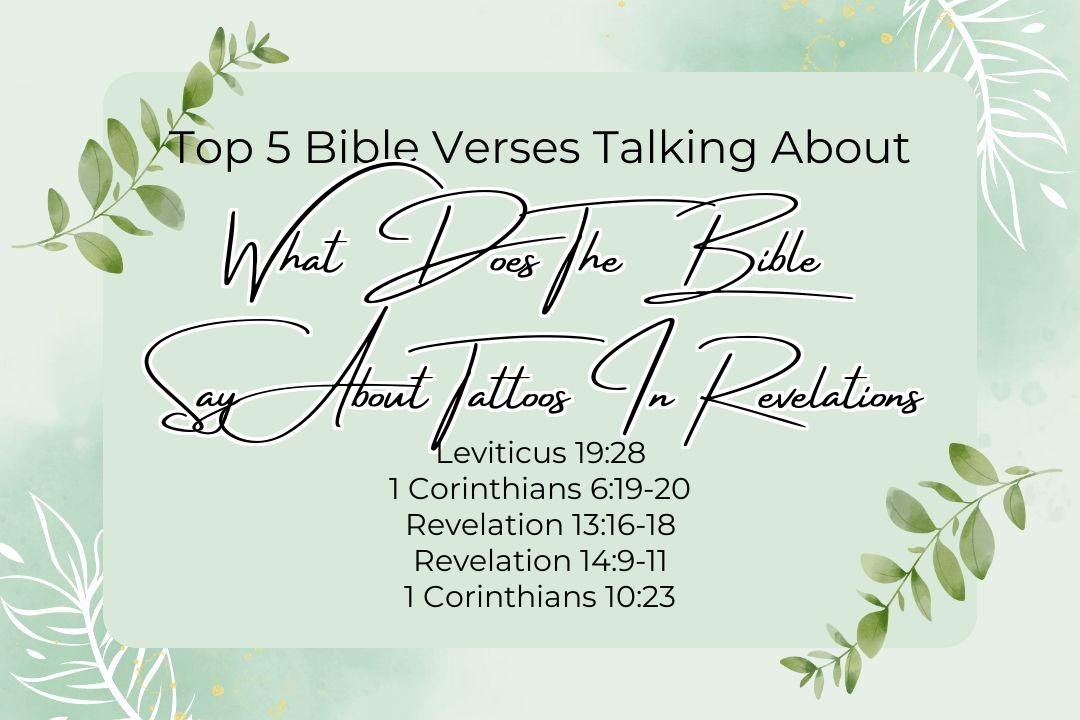I’ve always been fascinated by tattoos – I mean, who isn’t, right? Everywhere I look, it seems like someone’s got ink.
I was talking to this mate the other day, and he’s all like, ‘Doesn’t the Bible, you know, forbid them or something?’
He was going on about this verse in Leviticus…can’t remember the exact one, but apparently, it’s pretty clear-cut.
Then again, I’ve heard others say it’s not just Leviticus – supposedly, there’s some stuff in Revelation that’s warning us off tattoos too.
Trouble is, I’ve never actually sat down and read it for myself, so I’m left wondering, what does the Bible say about tattoos in Revelations, -or anywhere!- really?
And as a Christian, how am I supposed to navigate this whole thing?
Key Takeaways
- I’ve been digging into the book of Revelation, and it doesn’t look like tattoos are mentioned explicitly. Now, some folks might point to the “mark of the beast” in Revelation 13:16-18 and say it’s related to tattoos, but I think that’s a bit of a stretch.
- Flipping through Leviticus, I stumbled upon 19:28, which says we shouldn’t make any cuttings in our flesh for the dead or print marks on ourselves. That’s often interpreted as a no-go for tattoos, but is it still relevant today?
- Honestly, I’ve got mixed feelings about it – I mean, this is an Old Testament verse, so some Christians might argue it’s more of a cultural thing that doesn’t apply now. On the other hand, others still take it to heart.
- When I was reading 1 Corinthians 6:19-20, the phrase that jumped out at me was “your body is the temple of the Holy Ghost.” That’s a pretty powerful message about honoring God with our bodies… but does that necessarily mean no tattoos?
- For me, it all boils down to making an informed decision that aligns with my faith. As Christians, we should be praying and thinking critically about how our choices affect our relationship with God – and that’s particularly true when it comes to something as personal as getting a tattoo. Revelation 13:16-18 Leviticus 19:28
This word cloud offers a peek into the heart of our topic, showcasing the interconnected concepts we’ll be addressing.

Word cloud by BibleBreathe.com about what does the bible say about tattoos in revelations word cloud
Top 5 Bible Verses About What Does The Bible Say About Tattoos In Revelations
Honestly, I was a bit lost trying to wrap my head around this topic, but then I stumbled upon these Bible verses and, man, did they ever help clarify things.
There’s this one passage that kept popping up, seemed like it was begging to be read.
Take a gander at ’em, they do a way better job explaining all this than I ever could; it’s like they add this whole other layer to what we’re talking about.

Picture by BibleBreathe.com about What Does The Bible Say About Tattoos In Revelations
My Take on the Whole Biblical Tattoo Thing
I’ve had my fair share of questions on the biblical stance on tattoos, ‘specially with regards to Revelation.
So I figure, let’s dig into the nitty-gritty and look at the whole biblical context, you know?
Leviticus Law and All That Jazz
I’m reading Leviticus 19:28 and I see this:
“Ye shall not make any cuttings in your flesh for the dead, nor print any marks upon you: I am the Lord.” (Leviticus 19:28, KJV)
Now, at face value, this looks like a clear no on tattoos, but if you factor in the historical and cultural background of the time, it’s not that cut and dried.
A Blast from the Past
Back in the day, ancient Israel, tattoos were pretty tied up with pagan rituals and idolatry.
You got these nations all around ’em putting marks on themselves for their gods or the dead.
The Israelites, though, they were supposed to be set apart.
So this whole no-tattoo rule was pretty much a way to keep ’em unique, God’s own people, like.
Then I think of what Paul said:
“And be not conformed to this world: but be ye transformed by the renewing of your mind, that ye may prove what is that good, and acceptable, and perfect, will of God.” (Romans 12:2, KJV)
It makes me realize, hey, my actions, including getting ink, gotta be about what’s driving me. Is it the world or is it about honoring God?
Marks of Allegiance
Now, the book of Revelation mentions tattoos, kinda, but not like I’d thought. Revelation 13:16-18, you got the mark of the beast, which is just a big-time NO to God. Alright, not exactly the same thing as getting a modern tat, but you get this theme of body marks connected to some kinda idolatry.
As a Christian, gotta keep my priorities straight, not about how I look or what I do to myself, but what’s up between me and God.
My body’s like a temple for the Holy Spirit (1 Corinthians 6:19-20), so I gotta be good with how I use it.
Getting a tattoo, it’s on me, but I should totally look at it from a biblical angle.
Considering the implications and all that jazz, what’s front and center for me should be who I am in Christ, trying to honor Him however I go about it.
The New Testament and Tattoos
The Silence on Tattoos
When I started digging into the New Testament, it hit me that there’s this weird silence about tattoos.
Not one verse comes out and says they’re cool or not cool.
It’s kinda like the biblical authors are leaving it up to us to figure out what’s what – kinda like Paul did when he wrote,
“All things are lawful unto me, but all things are not expedient” (1 Corinthians 6:12, KJV).
I mean I was expecting some clear-cut direction, but nope.
Christian Liberty and Tattoos
So this got me thinking about this Christian liberty thing, which I think 1 Corinthians 6:19-20 and 10:23 explains pretty well.
It’s like Paul’s saying, our bodies are basically temples for the Holy Spirit, and we’ve got the freedom to choose what we want, as long as we’re not messing with others or disobeying God’s obvious commands.
But with that freedom, we’ve also gotta think about how our choices affect others and our relationship with God…which can be pretty tricky, if you ask me.
“What? know ye not that your body is the temple of the Holy Ghost which is in you, which ye have of God, and ye are not your own? For ye are bought with a price: therefore glorify God in your body, and in your spirit, which are God’s” (1 Corinthians 6:19-20, KJV)
When it comes to tattoos, I guess this means we should be looking at why we’re getting inked in the first place.
Are we trying to show off our individuality, honor God, or just fit in?
The Heart Behind the Ink
I think Revelations kinda comes into play here – not ’cause it talks about tattoos directly or anything, but ’cause it reminds us to check our motivations.
In the end, getting a tattoo isn’t the issue – it’s why we’re doing it that matters.
Are we genuinely trying to honor God, or are our desires and fears running the show?
As I’m trying to wrap my head around all this, I keep thinking that our bodies really are these temples for the Holy Spirit…so we should prob make choices that show we love and honor God with our whole hearts, souls, and everything else.
My Thoughts on The Book of Revelation and the Mark of the Beast

Photo modified by BibleBreathe.com. Original photo by Aaron Burden on Unsplash
Unpacking the Mark of the Beast
To be honest, whenever I start reading the Book of Revelation, folks often ask me about the mark of the beast and tattoos.
I reckon it’s time to dig in a bit deeper and see what the Bible’s got to say.
“And he causeth all, both small and great, rich and poor, free and bond, to receive a mark in their right hand, or in their foreheads” (Revelation 13:16, KJV).
I think this verse gets misunderstood a lot – people think it’s talking about a physical mark, like a tattoo or something, but we gotta look at the context and symbolism in Revelation.
Setting the Record Straight on the Mark of the Beast and Tattoos
So, the mark of the beast isn’t a tattoo, per se. It’s more like… a spiritual sign that you’re on the antichrist’s team. It’s about worshiping a false god, you know?
On the other hand, tattoos are just a way for people to express themselves, a form of art, really.
Some Christians might get tattoos, but that’s not the same as taking the mark of the beast.
Martin Luther once said, “The Bible is the cradle wherein Christ is laid.”
That’s crucial to keep in mind when we’re interpreting passages like Revelation 13:16-18 – we gotta understand what the Bible’s trying to say.
Unraveling the Symbolism of the Mark of the Beast
The mark of the beast is, like, a spiritual decision to follow the antichrist, not just a physical action. It’s a choice that’s gonna have eternal consequences, you feel me?
As Christians, we need to be aware of what our actions mean in the spiritual realm, make sure we’re not inadvertently siding with the enemy.
C.S. Lewis said, “You don’t have a soul. You are a soul. You have a body.” I think that’s key – we should focus on feeding our souls, not just our bodies.
As we navigate Revelation’s complexities, let’s keep our eyes on the spiritual truths that’ll set us free.
My Take on Christians and Tattoos
The Good, the Bad, and the Ugly – How Different Christian Groups View Tattoos
So I’ve been thinking about tattoos a lot lately, and I’ve come to realize that Christians are all over the place on this one.
I mean, some churches are cool with them, seeing them as a way to express yourself and showcase some awesome art, while others are totally against ’em, saying they go against what the Bible teaches.
I grew up in one of them traditional churches, and we were taught that tattoos were basically a no-go.
It was all about keeping the body pure, like a temple for the Holy Spirit (1 Corinthians 6:19-20, KJV) and all that jazz.
But the more I read the Bible, the more I’m like, “Hold up, it’s not that simple.”
“For in him we live, and move, and have our being; as certain also of your own poets have said, For we are also his offspring.” (Acts 17:28, KJV)
This verse always pops into my head when I’m thinking about tattoos. It’s like, our worth and identity come from being God’s kids, not from how we look.
So, What’s a Christian to Do? Considering the Bible and Your Own Conscience
As Christians, we gotta think long and hard about the Bible and our own personal values when it comes to tattoos.
We gotta ask ourselves the tough questions: Is this tattoo gonna honor God? Is it gonna trip someone else up?
I got a buddy who got a tattoo of a cross, and it’s been a total conversation starter – he’s been able to share his faith with tons of people because of it.
On the other hand, I know someone else who got a tattoo that was meant to be all spiritual and whatnot, but people keep thinking it’s some kind of occult symbol. Whoops.
“Whether therefore ye eat, or drink, or whatsoever ye do, do all to the glory of God.” (1 Corinthians 10:31, KJV)
I mean, that’s the key right there – we gotta do everything, tattoos included, for the glory of God.
Can Tattoos Actually Be a Good Way to Share Your Faith?
Sometimes I think tattoos can be a pretty cool way to spark conversations about God.
I mean, if you get a tattoo in a strategic spot, people are gonna notice, and you might just get the chance to share the Gospel.
But, you gotta be aware of your surroundings, you know? A tattoo that’s no big deal in one place might be a major deal-breaker in another.
At the end of the day, as Christians, we gotta approach tattoos with a humble heart, tryin’ to understand different perspectives, and just tryin’ to honor God in everythin’ we do.
In Revelation 19:16, it says Jesus has this name written on his robe and thigh – “KING OF KINGS, AND LORD OF LORDS” (KJV).
Now, I’m not sayin’ that’s a clear-cut endorsement of tattoos or anythin’, but it’s like… God’s not above usin’ physical symbols to get spiritual points across, you know?
My Take on Tattoos and the Bible
Are tattoos really a no-go according to the Bible?
I gotta say, people always ask me, “What does the Bible say about tattoos in Revelations?”
Honestly, I think there’s a whole lotta confusion goin’ on here.
So, let’s get one thing straight – the Bible doesn’t flat-out say no to tattoos.
Now, there’s this one verse in Leviticus 19:28 that people love to bring up:
“Ye shall not make any cuttings in your flesh for the dead, nor print any marks upon you” (KJV).
But, like, if we actually read it in context, it’s talkin’ about some old pagan rituals where people would mark themselves up as a way to worship or honor the dead.
Are tattoos really that bad?
Some folks think tattoos are, like, inherently bad or sinful or whatever.
But, is that what the Bible’s really sayin’? Nah, I don’t think so.
It’s more about why we’re doin’ something, not just what we’re doin’.
I mean, Paul said it best:
“Whatsoever is not of faith is sin” (Romans 14:23, KJV).
So, like, if you’re thinkin’ about gettin’ a tattoo, you gotta ask yourself what’s motivatin’ you.
Is it to give a shout-out to God, or is it just somethin’ selfish?
Judgin’ a book by its cover, or in this case, a Christian by their ink
I’ve met heaps of Christians with tats, and, man, they’re some of the most on-fire followers of Jesus I’ve ever had the pleasure of meetin’.
Just ’cause someone’s got ink don’t mean they’re any less spiritual or any less into their faith.
Like Peter said,
“Man looks on the outward appearance, but the Lord looks on the heart” (1 Samuel 16:7, KJV).
Let’s not judge a person by how they look. Instead, we should be checkin’ out their heart and who they are as a person.
Trying to Make Sense of Tattoos and the Bible
Figuring Out If It’s Cool to Get a Tattoo as a Christian
I’ve been thinking a lot about what the Bible says about tattoos, and honestly, I thought it was just gonna be some verse in Revelation or whatever, but it’s actually way more than that.
Like, the Bible doesn’t directly talk about tattoos like we think of them today, but there are some principles and stuff that can help us figure it out.
As I’m trying to weigh the pros and cons of getting a tattoo, this verse keeps popping up in my head:
“What? know ye not that your body is the temple of the Holy Ghost which is in you, which ye have of God, and ye are not your own?” (1 Corinthians 6:19, KJV)
Getting a tattoo is, like, super personal, but as a Christian, I gotta think about how it might affect my relationship with God and the people around me.
Thinking About How Tattoos Might Impact Relationships and Ministry
Sometimes I’m like, “Is this tattoo gonna be a problem for other people, or is it gonna be a conversation starter that helps me share the Gospel?”
I remember that story about Paul, who basically became whoever he needed to be to help people find Jesus (1 Corinthians 9:22-23).
As a Christian, my main goal is to point people to Jesus, not to myself, so if my tattoo is gonna be a distraction, I gotta rethink my decision.
“For though I be free from all men, yet have I made myself servant unto all, that I might gain the more.” (1 Corinthians 9:19, KJV)
Inner Change Is Way More Important Than How We Look
It’s crazy how easy it is to get caught up in how we look, especially with social media and all that. But as Christians, we’re supposed to be focusing on the inner transformation that only comes from knowing Jesus.
Revelation reminds us that God sees what’s going on in our hearts, not just how we look on the outside.
“And he that sat upon the throne said, Behold, I make all things new. And he said unto me, Write: for these words are true and faithful.” (Revelation 21:5, KJV)
So as I’m trying to figure out what the Bible says about tattoos, I keep coming back to this idea that my priority should be growing in my faith, not just trying to look a certain way. People might see my tattoo, but God sees what’s in my heart.
What Do You Think?
Honestly, I’d love to hear your thoughts on this – got some personal anecdote that kinda relates to what I was going on about?
Go ahead and share it down in the comments section, I’m all about learning from what you guys have been through.
If you found this post even remotely helpful, I’d super appreciate it if you could hit that share button – and hey, why not take a look around at some of the other stuff I’ve got going on over at BibleBreathe.com?

Photo modified by BibleBreathe.com. Original photo on Unsplash.
Frequently Asked Questions About What Does The Bible Say About Tattoos In Revelations
What does Revelation 13 say about the mark of the beast and tattoos?
To be honest with you, I was pretty surprised when I read Revelation 13 – it talks about the mark of the beast, but there’s no mention of tattoos whatsoever. I mean, the mark is more like… a symbol, you know? It shows you’re loyal to the Antichrist, but what it actually looks like? No idea. Some folks think maybe tattoos could be the mark, but the Bible doesn’t say that. What’s important is what the mark means: choosing between following God or, you know, the world.
Is getting a tattoo a sin according to the Bible?
Okay, so the Bible does mention tattoos – in Leviticus 19:28. But, I think, we gotta look at the context here. For me, it’s not the tattoo itself that’s the issue, it’s why I want one. Like, am I doing it to honor God or just to look cool? Will it make others go ‘that’s awesome!’ or will they be like ‘Uh, what’s up with that?’.
What does the Bible say about tattoos in the New Testament?
Straight up, the New Testament doesn’t say a word about tattoos. However, it does talk about how our bodies are kinda like… temples of the Holy Spirit (check out 1 Corinthians 6:19-20) and how we should try to live in a way that’s honoring to God (like in Romans 12:1-2). So when I’m thinking about getting a tattoo, I gotta ask myself: is this gonna line up with what I believe and stuff? Will it make God look good?
Does Revelation 19:16 say that Jesus has a tattoo?
Alright, so Revelation 19:16 does say Jesus has this name written on His thigh: ‘King of kings and Lord of lords’. Now, some people translate ‘written’ as ‘tattooed’, but I think it’s more like… a divine label or something. It’s not like Jesus went to the tattoo parlor and got inked; it’s more about showing His power and authority.
Matt Turner
I’m Matt, and I love breaking down Bible verses in a way that’s easy to understand and apply to everyday life. My goal is to help you connect with God’s Word and find practical ways to live it out. Whether you’re new to the Bible or just looking for some fresh insights, I’m here to walk with you and share what I’ve learned along the way.

